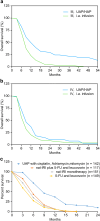Intra-arterial infusion chemotherapy versus isolated upper abdominal perfusion for advanced pancreatic cancer: a retrospective cohort study on 454 patients
- PMID: 31506738
- PMCID: PMC6800855
- DOI: 10.1007/s00432-019-03019-6
Intra-arterial infusion chemotherapy versus isolated upper abdominal perfusion for advanced pancreatic cancer: a retrospective cohort study on 454 patients
Abstract
Purpose: The treatment of pancreatic carcinoma remains a challenge as prognosis is poor, even if confined to a single anatomical region. A regional treatment of pancreatic cancer with high drug concentrations at the tumor site may increase response behaviour. Intra-arterial administration of drugs generates homogenous drug distribution throughout the entire tumor volume.
Methods: We report on treatment outcome of 454 patients with advanced pancreatic carcinoma (WHO stage III: 174 patients, WHO stage IV: 280 patients). Patients have been separated to two different treatment protocols. The first group (n = 233 patients) has been treated via angiographically placed celiac axis catheters. The second group (n = 221 patients) had upper abdominal perfusion (UAP) with stopflow balloon catheters in aorta and vena cava. Both groups have been treated with a combination of cisplatin, adriamycin and mitomycin.
Results: For stage III pancreatic cancer, median survival rates of 8 and 12 months were reached with IA and UAP treatment, respectively. For stage IV pancreatic cancer, median survival rates of 7 and 8.5 months were reached with IA and UAP treatment, respectively. Resolution of ascites has been reached in all cases by UAP treatment. Toxicity was generally mild, WHO grade I or II, toxicity grade III or IV was only noted in patients with severe systemic pretreatment. The techniques, survival data and detailed results are demonstrated.
Conclusions: Responsiveness of pancreatic cancer to regional chemotherapy is drug exposure dependent. The isolated perfusion procedure is superior to intra-arterial infusion in survival times.
Keywords: Intra-arterial infusion; Isolated perfusion; Pancreatic cancer; Quality of life; Regional chemotherapy.
Conflict of interest statement
Karl Reinhard Aigner declares that he has no conflict of interest. Sabine Gailhofer declares that she has no conflict of interest. Emir Selak declares that he has no conflict of interest. Kornelia Aigner declares that she has no conflict of interest.
Figures



Similar articles
-
Intra-arterial infusion chemotherapy with 5-fluorouracil and cisplatin in advanced pancreatic cancer: a feasibility study.Am J Clin Oncol. 2008 Feb;31(1):71-8. doi: 10.1097/COC.0b013e31807a328c. Am J Clin Oncol. 2008. PMID: 18376231
-
Comparison of intrahepatic and pancreatic perfusion on fusion images using a combined SPECT/CT system and assessment of efficacy of combined continuous arterial infusion and systemic chemotherapy in advanced pancreatic carcinoma.Cardiovasc Intervent Radiol. 2007 Sep-Oct;30(5):912-21. doi: 10.1007/s00270-007-9134-2. Epub 2007 Aug 21. Cardiovasc Intervent Radiol. 2007. PMID: 17710478 Clinical Trial.
-
Celiac axis infusion chemotherapy in advanced nonresectable pancreatic cancer.Int J Pancreatol. 1998 Jun;23(3):181-6. doi: 10.1007/BF02788395. Int J Pancreatol. 1998. PMID: 9629517 Clinical Trial.
-
[A new regional arterial infusion chemotherapy for patients with advanced pancreatic cancer].Gan To Kagaku Ryoho. 2002 Mar;29(3):383-9. Gan To Kagaku Ryoho. 2002. PMID: 11915727 Review. Japanese.
-
Intra-arterial infusion: overview and novel approaches.Semin Surg Oncol. 1998 Apr-May;14(3):248-53. doi: 10.1002/(sici)1098-2388(199804/05)14:3<248::aid-ssu9>3.0.co;2-8. Semin Surg Oncol. 1998. PMID: 9548608 Review.
Cited by
-
Therapeutic Effect of Regional Chemotherapy in Diffuse Metastatic Cholangiocarcinoma.Cancers (Basel). 2022 Jul 29;14(15):3701. doi: 10.3390/cancers14153701. Cancers (Basel). 2022. PMID: 35954364 Free PMC article.
-
Current status of non-surgical treatment of locally advanced pancreatic cancer.World J Gastrointest Oncol. 2021 Dec 15;13(12):2064-2075. doi: 10.4251/wjgo.v13.i12.2064. World J Gastrointest Oncol. 2021. PMID: 35070042 Free PMC article. Review.
-
Pancreatic Cancer: Challenges and Opportunities in Locoregional Therapies.Cancers (Basel). 2022 Aug 31;14(17):4257. doi: 10.3390/cancers14174257. Cancers (Basel). 2022. PMID: 36077794 Free PMC article. Review.
-
Regional Chemotherapy Is a Valuable Second-Line Approach in Metastatic Esophageal Cancer after Failure to First-Line Palliative Treatment.Curr Oncol. 2022 Jul 11;29(7):4868-4878. doi: 10.3390/curroncol29070386. Curr Oncol. 2022. PMID: 35877246 Free PMC article.
-
A case of pancreatic adenosquamous cell carcinoma with a pseudocyst following curative surgery.Surg Case Rep. 2024 Apr 1;10(1):74. doi: 10.1186/s40792-024-01868-z. Surg Case Rep. 2024. PMID: 38557796 Free PMC article.
References
-
- Aigner KR, Gailhofer S (2005) Celiac axis infusion and microembolization for advanced stage III/IV pancreatic cancer—a phase II study on 265 cases. Anticancer Res 25:4407–4412 - PubMed
-
- Aigner KR, Gailhofer S, Kopp S (1998) Regional versus systemic chemotherapy for advanced pancreatic cancer: a randomized study. Hepatogastroenterology 45:1125–1129 - PubMed
-
- Aigner K, Gailhofer S, Ben-Ari G (2016) Systemic and regional chemotherapy for advanced and metastasized pancreatic cancer. In: Aigner K, Stephens F (eds) Induction chemotherapy. Springer, New York, pp 243–251
MeSH terms
LinkOut - more resources
Full Text Sources
Medical

